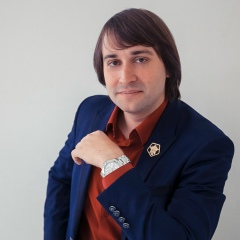3 СПОСОБА ЗНАЧИТЕЛЬНОГО ПОВЫШЕНИЯ ЛИЧНОЙ ЭФФЕКТИВНОСТИ:
1. Вести заметки. Просто записывать идеи и планы. На бумажку. А еще лучше - в компьютер. Смотреть на них время от времени. Это позволяет удерживать во внимании много больше объектов. Плюс они не исчезают, если у вас мало энергии и вы теряете сознание (поспали, устали, стресс и т.п.). Больше объектов во внимании - вы быстрее растете и нарабатываете опыт.
2. Обсуждать эти идеи и планы с другими людьми. Это включает второй уровень осознанности (первый - это когда вы сами у себя в голове размышляете, второй - это когда вслух проговариваете другим, третий - когда этот другой вслух проговаривает то, что он понял из того, что вы ему рассказали; попробуйте на досуге - узнаете много нового ;) Второй уровень осознанности помогает находить ошибки и искажения. Меньше ошибок - больше пользы ;)
2.1. Записывать то, что говорят и что думаете сами - во время того, когда общаетесь с другими людьми. Как это работает - смотри п.1.
3. Использовать итерационный подход. Итерация - это цикл. Смысл в том, что если вы до этого чего-то не делали - то трудно взять и сделать это с первого раза на 100%. По-любому будут ошибки и неточности. Поэтому проще принять факт, что более-менее качественный результат достигается минимум за 3-4 цикла. То есть 3-4 версия конечного результата - будет уже вполне себе. Это нивелирует негативную сторону перфекционизма, выражаемую в виде прокрастинации (то бишь откладывания выполнения дела). Откладываем обычно как раз из-за того, что с первого раза получается ерунда, а хочется, чтобы было круто. А чтобы круто - нужно много-много энергии вкачать, а ее у нас не всегда в избытке. Короче делаем циклами и с 3-4 раза будет вполне достойно (лучше, чем с первого раза). А дальше докручивать можно до бесконечности (зависит от конкретных целей). В итоге меньше энергии тратим на борьбу с собой. Больше влияем на результат.
1. Вести заметки. Просто записывать идеи и планы. На бумажку. А еще лучше - в компьютер. Смотреть на них время от времени. Это позволяет удерживать во внимании много больше объектов. Плюс они не исчезают, если у вас мало энергии и вы теряете сознание (поспали, устали, стресс и т.п.). Больше объектов во внимании - вы быстрее растете и нарабатываете опыт.
2. Обсуждать эти идеи и планы с другими людьми. Это включает второй уровень осознанности (первый - это когда вы сами у себя в голове размышляете, второй - это когда вслух проговариваете другим, третий - когда этот другой вслух проговаривает то, что он понял из того, что вы ему рассказали; попробуйте на досуге - узнаете много нового ;) Второй уровень осознанности помогает находить ошибки и искажения. Меньше ошибок - больше пользы ;)
2.1. Записывать то, что говорят и что думаете сами - во время того, когда общаетесь с другими людьми. Как это работает - смотри п.1.
3. Использовать итерационный подход. Итерация - это цикл. Смысл в том, что если вы до этого чего-то не делали - то трудно взять и сделать это с первого раза на 100%. По-любому будут ошибки и неточности. Поэтому проще принять факт, что более-менее качественный результат достигается минимум за 3-4 цикла. То есть 3-4 версия конечного результата - будет уже вполне себе. Это нивелирует негативную сторону перфекционизма, выражаемую в виде прокрастинации (то бишь откладывания выполнения дела). Откладываем обычно как раз из-за того, что с первого раза получается ерунда, а хочется, чтобы было круто. А чтобы круто - нужно много-много энергии вкачать, а ее у нас не всегда в избытке. Короче делаем циклами и с 3-4 раза будет вполне достойно (лучше, чем с первого раза). А дальше докручивать можно до бесконечности (зависит от конкретных целей). В итоге меньше энергии тратим на борьбу с собой. Больше влияем на результат.
3 METHOD OF SIGNIFICANT IMPROVEMENT OF PERSONAL EFFICIENCY:
1. Keep notes. Just write down ideas and plans. On a piece of paper. Better yet, into a computer. Watch them from time to time. This allows you to keep in mind a lot more objects. Plus, they do not disappear if you have little energy and you lose consciousness (sleep, tired, stress, etc.). More objects in attention - you grow faster and gain experience.
2. Discuss these ideas and plans with other people. This includes the second level of awareness (the first is when you are thinking in your own mind, the second is when you are speaking out loud to others, the third is when this other is speaking out loud what he understood from what you told him; try at your leisure - learn a lot;) The second level of awareness helps to find errors and distortions. Less mistakes - more good;)
2.1. To write down what they say and what you think yourself - during the time when you communicate with other people. How it works - see point 1.
3. Use an iterative approach. An iteration is a loop. The point is that if you haven’t done something before, it’s hard to take and do it the first time at 100%. In any case there will be errors and inaccuracies. Therefore, it is easier to accept the fact that a more or less qualitative result is achieved in at least 3-4 cycles. That is, the 3-4 version of the final result will be quite imagined. This eliminates the negative side of perfectionism, expressed in the form of procrastination (that is, putting off the execution of a case). We usually postpone just because the first time we get nonsense, but I want it to be cool. And to be cool, you need to pump in a lot of energy, and we don’t always have plenty of it. In short, we do it in cycles and from 3-4 times it will be quite worthy (better than the first time). And then you can twist to infinity (depending on specific goals). As a result, we spend less energy on fighting with ourselves. More influence on the result.
1. Keep notes. Just write down ideas and plans. On a piece of paper. Better yet, into a computer. Watch them from time to time. This allows you to keep in mind a lot more objects. Plus, they do not disappear if you have little energy and you lose consciousness (sleep, tired, stress, etc.). More objects in attention - you grow faster and gain experience.
2. Discuss these ideas and plans with other people. This includes the second level of awareness (the first is when you are thinking in your own mind, the second is when you are speaking out loud to others, the third is when this other is speaking out loud what he understood from what you told him; try at your leisure - learn a lot;) The second level of awareness helps to find errors and distortions. Less mistakes - more good;)
2.1. To write down what they say and what you think yourself - during the time when you communicate with other people. How it works - see point 1.
3. Use an iterative approach. An iteration is a loop. The point is that if you haven’t done something before, it’s hard to take and do it the first time at 100%. In any case there will be errors and inaccuracies. Therefore, it is easier to accept the fact that a more or less qualitative result is achieved in at least 3-4 cycles. That is, the 3-4 version of the final result will be quite imagined. This eliminates the negative side of perfectionism, expressed in the form of procrastination (that is, putting off the execution of a case). We usually postpone just because the first time we get nonsense, but I want it to be cool. And to be cool, you need to pump in a lot of energy, and we don’t always have plenty of it. In short, we do it in cycles and from 3-4 times it will be quite worthy (better than the first time). And then you can twist to infinity (depending on specific goals). As a result, we spend less energy on fighting with ourselves. More influence on the result.

У записи 24 лайков,
7 репостов.
7 репостов.
Эту запись оставил(а) на своей стене Павел Емельянов










































